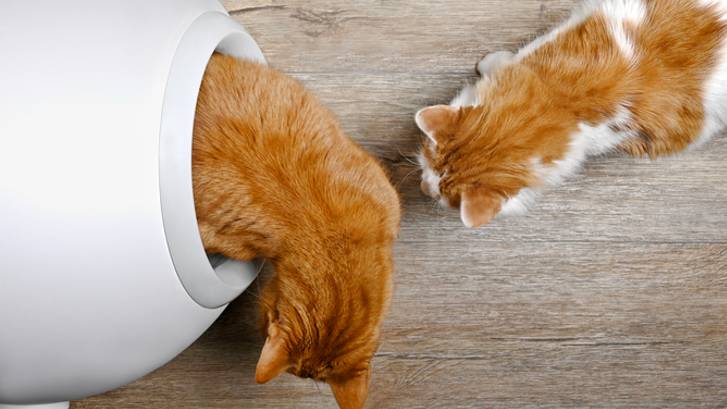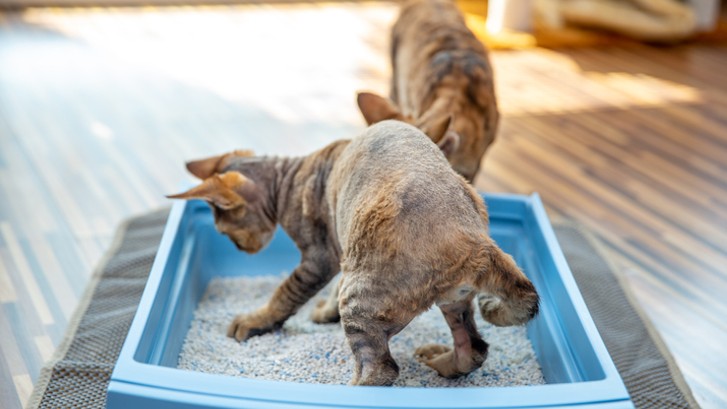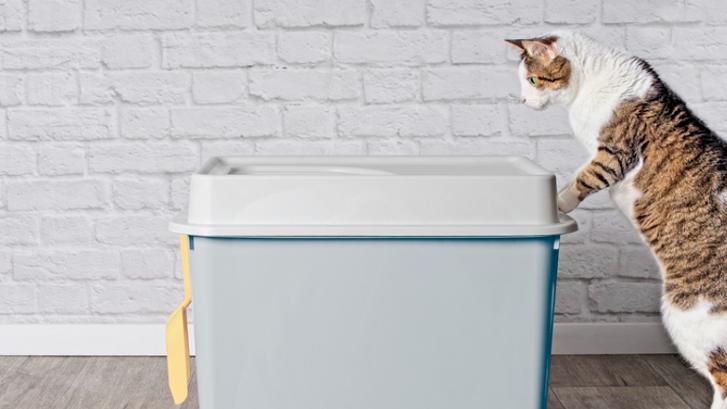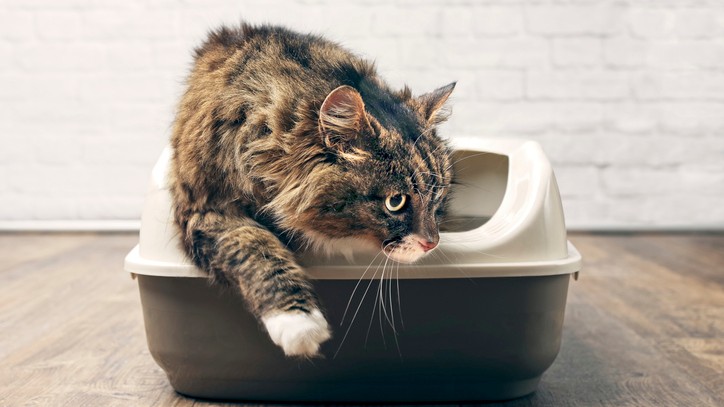Can cats share a litter box? How many litter boxes per cat
Ever wondered whether cats can share a litter box? So, how many litter boxes do you need per cat?

Get the best advice, tips and top tech for your beloved Pets
You are now subscribed
Your newsletter sign-up was successful
If you live in a household with more than one feline family member, you might wonder whether your cats can share a litter box, or indeed how many litter boxes per cat is required, particularly if you feel like you spend most of your time cleaning up their kitty toilet.
It can also be frustrating if one of your cats is prone to peeing outside the litter box or seems to want to urinate in the bath or a particular corner of the living room. What if the litter box options you've provided for your cats are the reason why their toileting isn't going to plan? Can cats share a litter box? Or do they need one each?
This article will explore the best number of litter boxes to provide in your household, as well as answering common questions you may have about your cats' litter box habits.
Is it OK for cats to share a litter box?
The most important thing to remember when it comes to cats is that you can't force them to do something they don't want to do! So, while some cats are comfortable sharing a litter box, others aren't keen at all. Cats are very clean animals, and they're also pretty fussy. So, even if they don't protest (and I mean dirty protest!) at being made to share their litter tray with another cat, they'll still want it to be spotlessly clean!
The truth is that although some cats will tolerate sharing litterboxes, nearly all prefer to have multiple litterboxes to choose from. This means they can inspect each tray and choose whichever suits their needs in terms of privacy, scent, and cleanliness.

How many litter boxes for one cat?
The best guideline for the number of cat litter boxes to provide in your purry palace is to have one litter box per cat and at least one extra. So, you should provide at least two litterboxes for just one cat. This allows your puss to select the tray that gives them the most privacy and peace. It also means that if you're out and about and can't clean their tray immediately, they have another clean toilet ready to go.
What about 2 or 3 cats? How many litter boxes do they need then?
Following the same rule, if you have two cats, you should have three litter boxes, and if you have three cats, you should have four litter boxes. This means that your felines can choose a preferred pooping place if they wish. However, they also have other options if their favourite is occupied or in a noisy part of the house. This can help reduce your cats' stress, improving their bonds with each other and keeping your household harmonious.
Get the best advice, tips and top tech for your beloved Pets
If you need to increase your number of litter boxes, check out our guide to the best cat litter boxes to find something suitable for your cats.
What’s the best way to use a litter box?
Other factors are important, not just the number of litter boxes. Choosing the best type of cat litter for your cat can help. Cats will often prefer a particular style of litter box, perhaps one with a roof and a door or one with tall sides. Arthritic or less mobile cats might like a litter box with lower walls, though, and some cats are scared of a cat flap door. It's all about finding what works best for your kitty. Here’s our guide to the best cat litters to help you choose.
The location of the litter box is also important. Choosing a quiet part of the house, away from the footfall, usually works best. Keeping the litter box impeccably clean is really important but try to steer clear of strong-smelling cleaning products because many cats don't like the scent.
Here’s some more advice on how to get a cat to use a litter box.

How to stop territorial aggression in the litter box
By providing more litter boxes than you have cats, you’ll be helping to alleviate or prevent territorial aggression, but there are more measures you can take:
- Keep the litter boxes as clean as possible to stop them from smelling of any of your cats' individual scents. Many cats are put off by a litter box that smells of another cat. By keeping it smelling fresh, you'll also help prevent unwanted accidents.
- Use calming and anti-stress diffusers near the litterboxes to keep your cats feeling chilled.
- Try adding another litter box. Even if you're already using the 'number of cats plus one rule, your cats might still benefit from another tray.
- Speak to your veterinarian if you are struggling to control your cats’ territorial aggression.
Frequently asked questions

Can kittens share a litter box?
Kittens are clever and tend to be pretty easy to litter train. Many kittens will share litter boxes while they are young. This is due to their sibling bond and because they are not yet sexually mature. Once they become more mature, their hormones will start to affect their behaviour and scent, and they'll desire their own space.
Can sibling cats share a litter box?
You might assume that cats who are siblings will share a litter box, but it's very rare for adult cats to tolerate sharing a tray regardless of whether they are related. This is also the case with cats of the same gender — many assume that two females will share a litter box, but this is unlikely.
Why do my cats share a litter box?
Occasionally, cats will choose to share a litter box. However, rather than wanting to share, it's more likely to mean that they have got into the habit of using a particular litter box and are now reluctant to change. As long as the litter box they are using is acceptably clean, they'll stay put. You should still provide a spare litter tray for your cats in case of emergencies.
My cat won't share a litter box; what do I do?
It's crucial not to force your cats to share a litter box, as doing so can cause them to become aggressive. The best thing to do is to provide multiple litter boxes and ensure they are kept as clean and fresh as possible.
Conclusion
Keeping all your four-legged friends happy in a multi-cat household can be a bit of a juggling act! But solving litter box issues can really help the dynamic between your cats and save you from having to clean up so many accidents!
Dr Hannah Godfrey is a small animal vet who graduated from the Royal Veterinary College in 2011 and began work straight away at a busy mixed practice. Initially, she treated all species, but focussed on small animals from 2014. She has a passion for soft tissue surgery, ultrasound, and canine and feline dentistry, having completed additional training in these areas.

